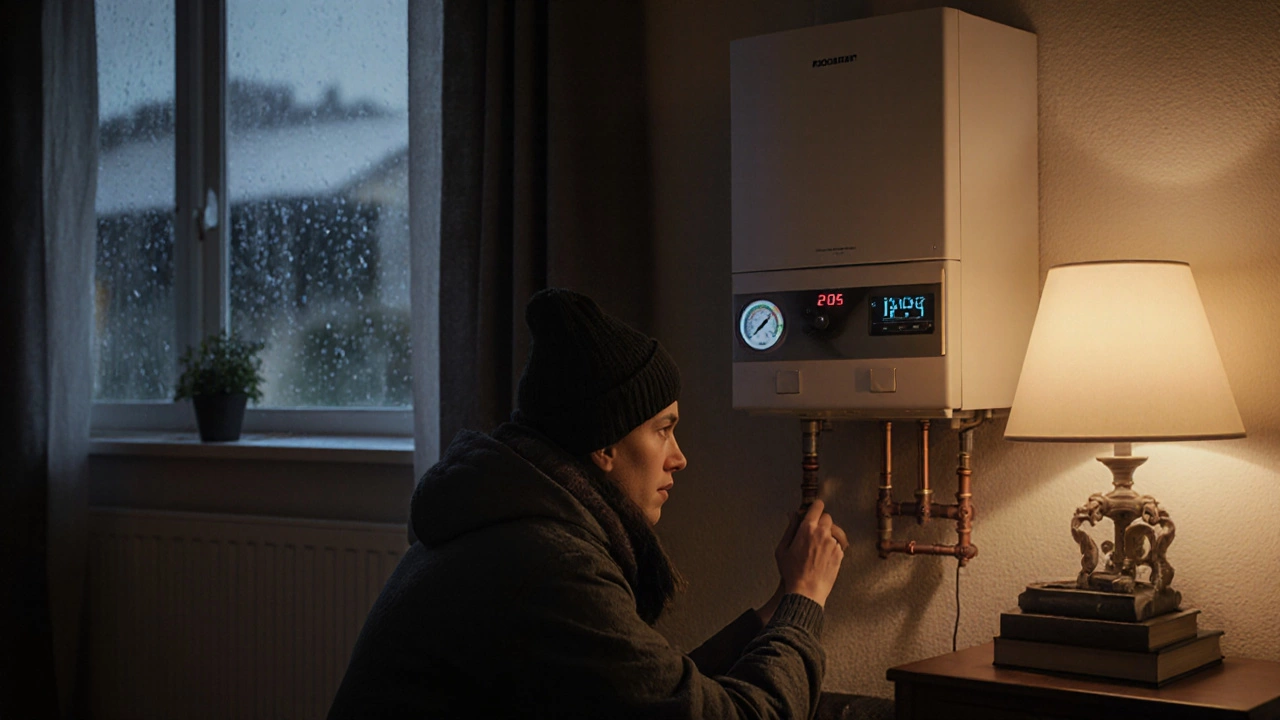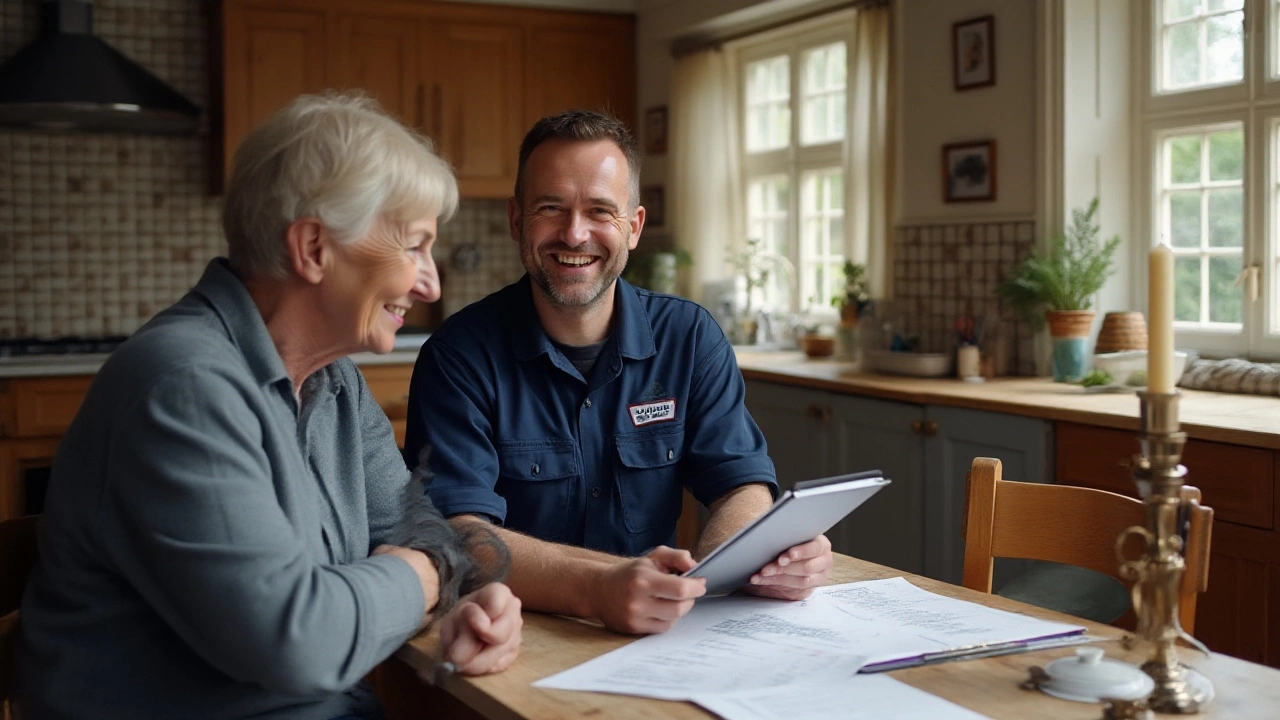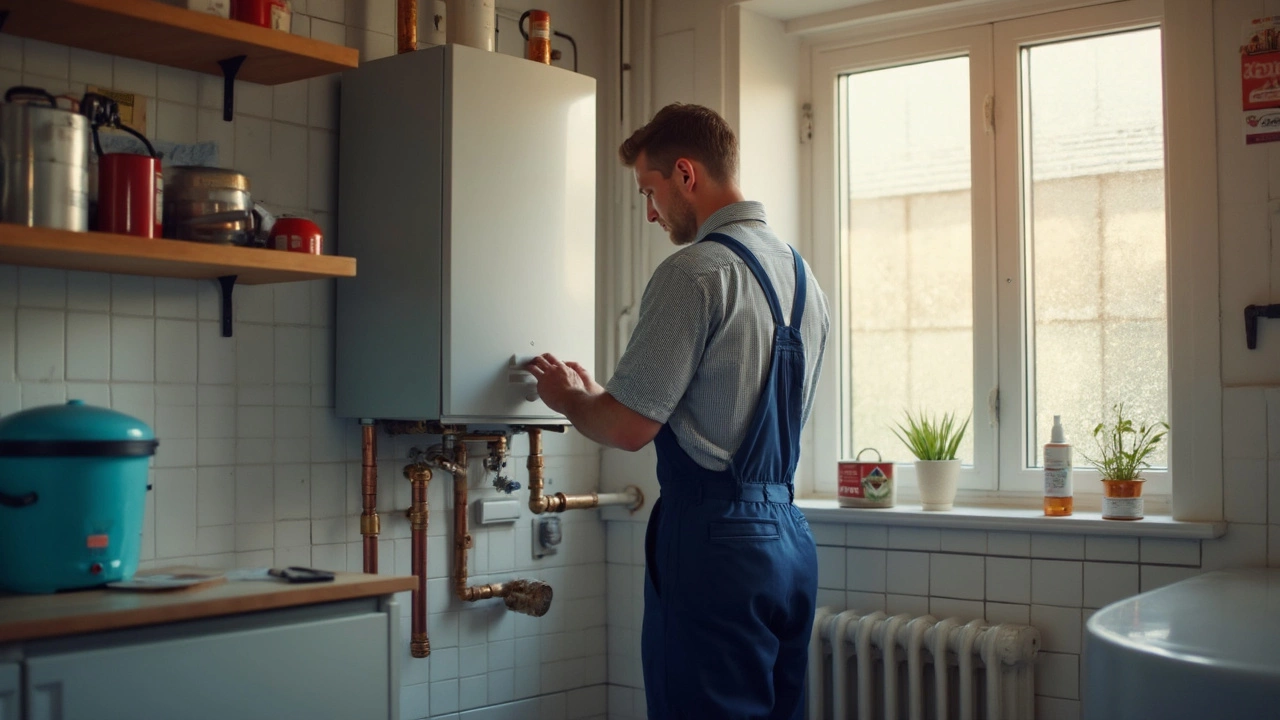Ever found yourself staring at a cold radiator and wondering if it’s your wallet that’s about to take a hit? If you’re dealing with boiler issues, you’ll want to know exactly who’s supposed to cover the cost of maintenance. It might sound straightforward, but the answer actually hinges on whether you own or rent—and the small print could leave you surprised if you’re not careful.
For homeowners, there's no sugarcoating it: maintenance costs usually land squarely in your lap. That means annual checkups, quick fixes, and even those annoying late-night leaks. Renting? The financial side gets trickier. In most cases, landlords are expected to handle boiler servicing, but plenty of tenants have been caught off-guard when leases sneak in extra clauses. The best move? Double-check your rental agreement and never assume someone else is footing the bill.
- Basic Boiler Maintenance Explained
- Homeowners: Paying Out of Pocket
- Renters and Landlords: Who’s Responsible?
- Home Warranty and Service Plans
- Avoiding Costly Boiler Repairs
- What If No One Pays?
Basic Boiler Maintenance Explained
Unless you like cold showers and freezing toes, regular boiler maintenance isn’t something to skip. It’s all about keeping the system safe, efficient, and less likely to break down on the coldest morning of the year. Most UK energy experts—and plenty of repair techs—recommend getting your boiler serviced once a year. That’s usually enough to avoid most nasty surprises, but it’s also often needed to keep your warranty valid.
What actually gets done during a typical boiler service? Here’s what to expect:
- Visual inspection for leaks, corrosion, and weird noises.
- Checking and cleaning the main components (think: heat exchanger, burner, and fan).
- Testing gas pressure and flow.
- Looking at seals, flues, and safety devices for proper function.
- Making sure everything meets safety standards, especially for carbon monoxide risks.
Even if your boiler seems fine, dust and grime can build up over a year, putting stress on key parts. Plus, a small leak can quickly become a big (and expensive) problem. Think of it like going to the dentist: annoying, but you’ll thank yourself later.
| Average Cost | Service Time | Most Common Fault Found |
|---|---|---|
| £90 - £140 | 40 - 60 mins | Pressure issues |
Quick tip—keep an eye on your boiler’s pressure gauge and listen for new noises. Catching small things early can dodge a big repair job down the line. And always use a Gas Safe registered engineer for checks and repairs. If you don’t, you’re risking both your home insurance and, honestly, your family’s safety.
Homeowners: Paying Out of Pocket
If you own your home, you’re on the hook for all boiler maintenance expenses. Annual boiler service isn’t just some fancy extra—it’s a must if you want to avoid disaster during winter. Skipping maintenance can void manufacturer warranties, jack up your energy bills, and leave you begging for an emergency repair when it’s freezing out.
Here’s the real cost breakdown most homeowners don’t think about. A basic boiler service visit in the UK, for example, costs anywhere from £80 to £120, depending on where you live and the type of boiler. If you let things slide and need a big repair—think broken heat exchanger or major leaks—you’re looking at bills anywhere from £200 to over £800. The big stuff, like replacing the boiler, could empty your pockets by £2,000 to £4,500 easily.
| Service/Repair | Average Cost (£) |
|---|---|
| Annual Service | 80 - 120 |
| Minor Repair (valves, thermostat) | 100 - 250 |
| Major Repair (heat exchanger, pump) | 200 - 800 |
| Full Replacement | 2,000 - 4,500 |
Most pros recommend annual servicing. This involves checking for leaks, testing controls, inspecting pressure, and cleaning out built-up gunk. You can book this with a Gas Safe registered engineer, which is the law in the UK. In the US, you'll want a licensed HVAC technician.
Want to save cash? Try these moves:
- Set a reminder for yearly checks—don’t skip, especially before winter.
- Bleed your radiators now and then to keep them working smoothly.
- Keep boiler pressure in the recommended range (usually 1-1.5 bar for most modern models).
- Look into service plans—some providers will spread cost over 12 months, which can help prevent big surprise bills.
Sure, shelling out feels rough, but staying on top of maintenance keeps repair costs and stress low in the long run. Ask anyone who’s gone through a mid-January breakdown with no heat—routine care beats emergency chaos every time.
Renters and Landlords: Who’s Responsible?
This is where things can get complicated. If you’re renting, there’s a good chance you expect the landlord to handle boiler issues. The law usually backs you up. In most places across the UK—including England, Scotland, and Wales—landlords must keep the heating system (including the boiler) in good working order. That means they’re generally responsible for boiler maintenance, annual inspections, and repairs if the system goes wonky.
There’s even more backup: the UK’s Landlord and Tenant Act 1985 straight up says landlords are responsible for repairs to the property’s installations for heating and hot water. This isn’t just about fixing breakdowns—regular servicing counts, too, since a dodgy, neglected boiler can become a safety hazard.
But don’t get too comfy. Tenants should still keep an eye on their boiler and tell the landlord as soon as something feels off. If you ignore a problem and things get worse, you could end up responsible for the cost of extra damage. Most tenancy agreements spell out exactly what you should do—like reporting breakdowns within 24-48 hours.
Here’s what usually falls on landlords:
- Annual boiler servicing and safety checks
- Repairs due to normal wear and tear
- Making sure the heating and hot water work—all year round
But tenants, you’re not off the hook for everything. You’ve got to treat the system right. If you break something on purpose (yep, kicking the radiator doesn’t count as maintenance), you’ll likely have to pay. And simple stuff—like bleeding a radiator—might still be on you.
Bottom line: check your lease carefully, and if you’re unsure, just ask the landlord before you reach for your wallet or call out a repair team. Knowing who’s responsible saves headaches—and a lot of cash.

Home Warranty and Service Plans
If you’ve ever groaned at a boiler breakdown, home warranty and service plans might catch your eye. These plans sound like a safety net, and sometimes they make a real difference. With a good home warranty, the company picks up the tab for repairs and maintenance on your boiler—at least, up to a limit. Usually, these contracts cover unexpected failures and may toss in one annual checkup. But here’s the catch: every plan is different, so you have to read the details or risk finding out too late that limescale buildup isn’t included.
Some providers only pay out if you’ve stuck to the basics—like regular servicing by a certified engineer. Slacking on those yearly checkups can give them an excuse to pass the cost back to you anyway. Service plans work a bit differently from warranties. They’re more about prevention: you pay a fixed fee each month or year, and in exchange, you get routine inspections, minor tweaks, and sometimes parts replacement. Think of it like a membership to peace of mind for your boiler maintenance costs.
- Look for service plans that include emergency callouts—otherwise, you could be shelling out extra in a crisis.
- Ask if there’s a cap per claim or an annual limit. Those upper limits can bite if your boiler decides to retire early.
- Some plans only approve repair work from their chosen engineers, so check if you’ll be locked in or if you can choose your own trusted pro.
- Remember, almost all plans require that you keep records of every service. A missing receipt will leave you in a bind if things go south.
The lesson? Service plans and warranties can save big money, but only if you know what’s in your agreement. Always read the fine print and keep your documents handy—you won’t regret it if your boiler goes silent in the middle of a cold snap.
Avoiding Costly Boiler Repairs
This is where a tiny bit of effort makes a big difference. You can dodge a fat repair bill for your boiler by sticking to a few practical habits and knowing the warning signs before things get serious, whether you own your place or rent.
The golden rule is to schedule a yearly service by a qualified engineer. According to the Energy Saving Trust, boilers that get a proper check-up every 12 months run more efficiently and break down less. Neglecting maintenance is the fastest way to guarantee bigger problems later – and those repairs aren't cheap. In the UK, the average boiler repair bill runs from £150 for minor fixes to over £400 for major issues.
- Boiler maintenance tip number one: bleed your radiators at least once a year. If they're cold at the top and hot at the bottom, they've trapped air—which puts extra pressure on the system and forces your boiler to work harder.
- Keep an eye on your pressure gauge. Boilers work best when the pressure is between 1 and 2 bars. Anything much higher or lower, and you should call in a pro.
- Listen for weird noises—clanking, banging, or gurgling can mean limescale or sludge is building up in the pipes. Catching these early can save you a lot of money.
- Insulate your pipes, especially if you live somewhere cold. Frozen pipes aren't just annoying—they can cause serious (and expensive) damage to your boiler.
Don’t forget to check your warranty. Some boiler manufacturers won’t honor their warranty if you can’t prove you’ve had it serviced regularly.
| Issue | Average Cost (£) |
|---|---|
| Minor Leak | 150 |
| Broken Thermostat | 180 |
| Faulty Pump | 250 |
| Major Boiler Breakdown | 400+ |
If you’re renting, report issues to the landlord right away—waiting even a week could make a small fault much worse. Homeowners can also save by getting on a service plan or even a monthly cover that covers breakdowns, so that surprise visit from the engineer won’t destroy your budget.
What If No One Pays?
This is where things get messy. If nobody steps up to cover boiler maintenance, everyone's comfort and even safety are at risk. Boilers that go unserviced can break down without warning. Even worse, a busted boiler can leak carbon monoxide, which is a real health danger. According to the Gas Safe Register, poorly maintained boilers are one of the top causes of accidental carbon monoxide poisoning in the UK.
Ignoring the problem often leads to bigger headaches later. Clogged pipes, leaks, even expensive part failures usually pop up after months (or years) of no checkups. Average repair bills can shoot up fast. Here's a snapshot of real boiler repair costs:
| Issue | Estimated Cost (£) |
|---|---|
| Minor repair (valve or thermostat) | £70 - £150 |
| Replacing heat exchanger | £400 - £500 |
| Full boiler replacement | £1,800 - £3,000 |
For tenants, if your landlord refuses to pay, you might be able to report them. In the UK, local councils can force landlords to step in for essential heating repairs. In the US, tenants sometimes have the right to pay for emergency repairs and deduct the cost from rent, but only if state law allows it. Always keep records and check your rights first.
On the flipside, if you own your home and skip maintenance, you’re probably voiding your warranty and insurance coverage. Most providers require proof of regular service to honor claims.
"Failing to maintain your boiler isn’t just about comfort—it’s about safety. Annual servicing dramatically reduces the risk of breakdown and dangerous faults," says Mark Smith, registered heating engineer and member of the Chartered Institute of Plumbing and Heating Engineering.
- If you’re a tenant, contact your landlord in writing if heating fails.
- Homeowners should mark boiler servicing in their calendar annually.
- If you hit a dead end and live in the UK, contact your local council; in the US, check local housing laws.
- Always save repair receipts and correspondence for backup.
No one enjoys spending money on the boiler, but skipping service can cost far more—in cash and peace of mind—down the line.



